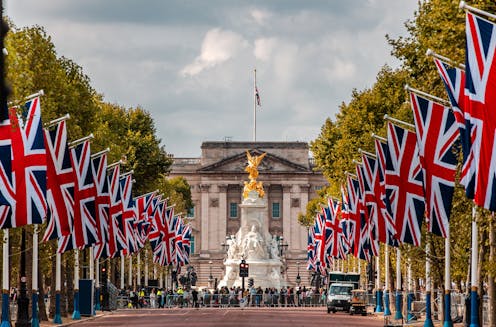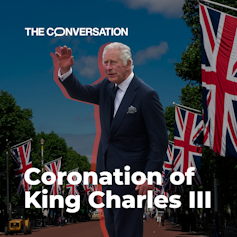
Love them or loathe them, the royal family are up there with red telephone boxes and scones when it comes to images of Britishness. Souvenir shops are full of their faces, newspapers across the world discuss them, and television dramas based on their lives have never been more popular.
Whenever people are critical of the royal family, the oft-repeated retort is “but think of the tourism!”. This has been particularly common rhetoric recently, as many people question how a country facing mass strikes and a crippling cost of living crisis can afford the estimated £100 million cost of King Charles III’s coronation.
In a recent YouGov poll, 51% did not believe the coronation should be paid for by taxpayers. For young people, this figure was even higher, at 62%. But supporters will often use tourism as justification for lavish expenses.

This piece is part of our coverage of King Charles III’s coronation. The first coronation of a British monarch since 1953 comes at a time of reckoning for the monarchy, the royal family and the Commonwealth.
For more royal analysis, revisit our coverage of Queen Elizabeth II’s Platinum jubilee, and her death in September 2022.
The royal family does bring tourism to the UK. The economic consultancy Centre for Economics and Business Research estimated that the coronation weekend would lead to a £337 million boost from tourism and pub spending.
But if the royal family were to disappear, would the UK’s tourism industry suddenly implode?
2011 research by Visit Britain found that around 60% of tourists to the UK are likely to visit places associated with the royal family. While there is no more recent specifically royal data, in 2022 Visit Britain found that history and heritage was the biggest pull factor to tourists.
And while the international perception of Britain is certainly intertwined with the royal family, this does not tell us whether a reigning royal family is necessary for tourism. After all, the history surrounding the monarchy and places associated with them would still be here even if the royal family was not. Ottoman palaces of Istanbul remain wildly popular attractions 100 years since the collapse of the caliphate, as are the royal châteaus of France or imperial palaces of China.
Lack of royalty does not seem to have affected these countries’ appeal, each of which attract more tourists annually than the UK.
A special relationship
The USA is the UK’s largest tourist market, and American tourists do seem to be very fond of things associated with British royalty.
But this may change with the new monarch. In a poll taken in February 2021, before the death of Queen Elizabeth II, a whopping 68% of Americans viewed her favourably. The same poll found only 34% had a favourable opinion of Charles – but this has changed in his favour following his accession to the throne, according to a poll taken before the coronation which gave him a 50% approval rating in the US. That said, 62% of people in the US said they did not care about the coronation very much or at all.
Outside America, the UK’s next largest tourist groups have significantly less interest in the royal family. The holiday firm Travelzoo found in 2016 that just 19% of German, 15% of French and only 10% of Spanish travellers want to come to the UK because of the British monarchy.
Where do tourists go?
Typically, when commentators discuss the royal contributions to tourism, they talk about significant events such as weddings, jubilees, coronations and funerals. Even though these events attract huge crowds, they happen rarely and are unrepresentative of the tourism industry as a whole. Research has found that royal weddings massively improve a country’s image and brand awareness, but are not comparable to major mega events such as the Fifa World Cup, the Super Bowl or the Olympics.
Even though royal places are popular, they are far from our most popular attractions. Of Britain’s ten most visited free and paid-for attractions in 2021, none were royal attractions. The highest ranking royal attraction was the Tower of London, making only 17th on the list.
Typically, Chester Zoo attracts more visitors than Windsor Castle or Buckingham Palace, although these statistics do not differentiate between domestic and international tourists. In the most recent Windsor visitor survey, the majority of its tourists came from overseas.

Anti-monarchy group Republic has disputed the widely cited figure that the monarchy generates £500 million in tourism income for the UK annually – which itself would be only a small fraction of Britain’s £127 billion tourism economy.
The group also questions why royalty barely feature on British tourism campaigns or advertisements, if they are so vital to the tourism economy.
It is impossible to deny that royalty adds to the UK’s appeal as a tourist destination – the history and associated heritage is famous worldwide. However, what is questionable is whether a reigning monarchy is necessary for this attractiveness to continue.
Ross Bennett-Cook does not work for, consult, own shares in or receive funding from any company or organisation that would benefit from this article, and has disclosed no relevant affiliations beyond their academic appointment.
This article was originally published on The Conversation. Read the original article.







